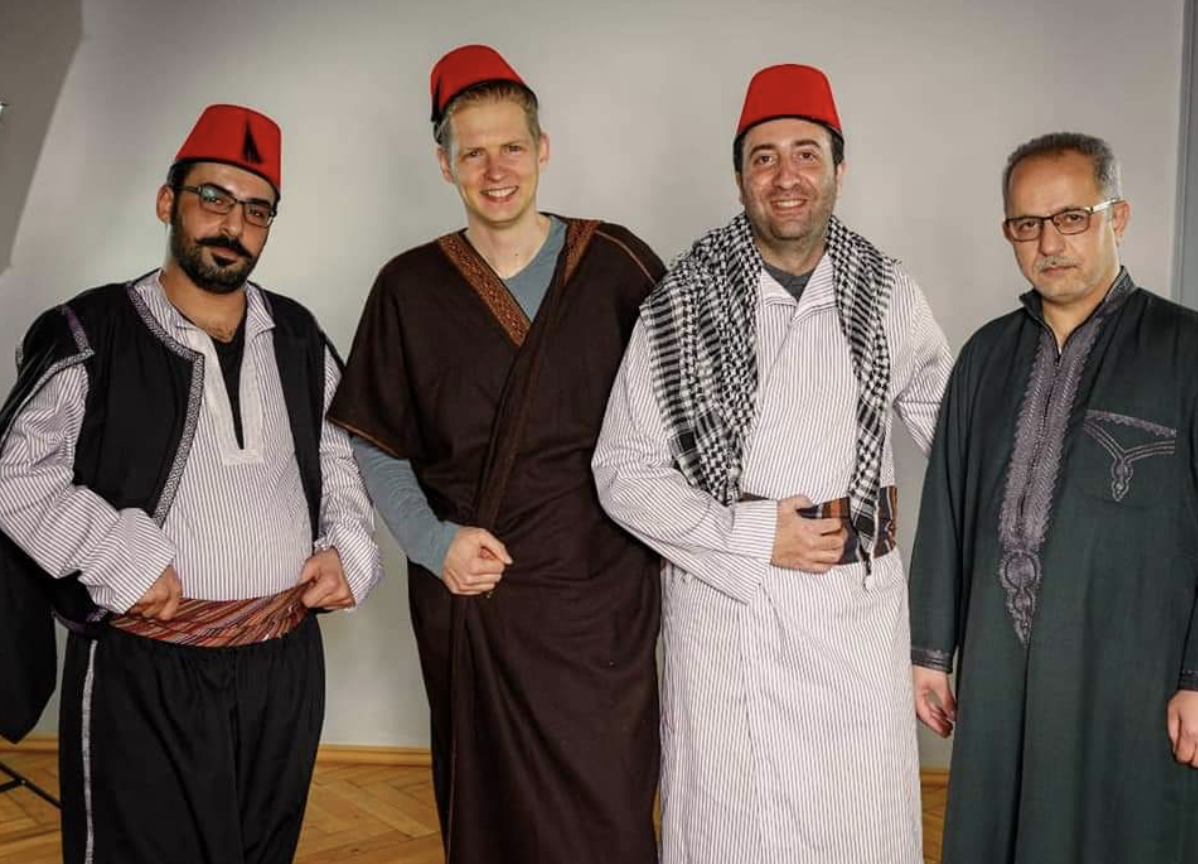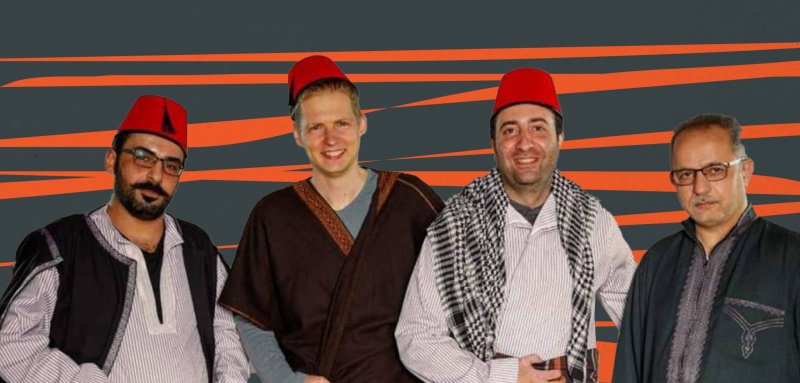As one chapter ends and another begins, Syrians begin new lives in Thuringia, Germany. They discuss their priorities and how they adjust to their new environment. They make small impacts and meaningful contributions to their community. They see each opportunity as a stepping stone toward integrating and achieving success.
A community of support
Nader Raslan is a project manager and cofounder of the Syrian Cultural Center in Erfurt, the capital of Thuringia in Germany. Raslan established the center in 2022 to address a major gap when it comes to helping Syrian refugees resettle in Germany: “While various organizations assist Syrian refugees, none are led exclusively by Syrians."
Despite limited resources, the center operates with a central mission: "Our goal is to implement our ideas, offer the refugee perspective, showcase Syrian culture, and strengthen the Syrian community in Thuringia."
"We see ourselves as the primary representatives of our people here," Raslan said. Community building and fostering integration are key roles of the center. "Newly arrived families and individuals need not feel isolated; they can engage in our activities and meet Syrians and locals alike," he added.
As it grows, the center's founders are still finalizing structure and staffing needs. "Our focus remains on small-scale projects; we operate entirely on volunteerism and rely mainly on funds from the State of Erfurt," Raslan explained.
Mohamed, a thirty-two-year-old resident of Erfurt for over eight years, expressed that aside from his circle of friends, he is not deeply connected to the Syrian community. "Everyone needs support when settling in. I believe anyone who has experienced such a life-changing transition should lend a hand in any way they can, not limited to Syrians or Arabs."
The Syrian diaspora in Thuringia also maintains an active digital presence, particularly on Facebook. Like many other communities, members use these platforms to connect and offer assistance with job searches, navigating bureaucratic processes like renting apartments, scheduling appointments with immigration offices, and obtaining driver's licenses.
Additionally, the community uses digital platforms to market products from their shops, restaurants, and side businesses, such as home-cooked meals and handyperson services.
Small impact, better shawarma
Tens of Syrian restaurants and bistros are becoming increasingly popular across Thuringia, where Syrians constitute the second-largest group of foreign residents. According to the Federal Statistical Office, as of December 2023, 22,055 Syrians are living in the state.
Ahmed Jassem has been collaborating with his brother Mohamed for three years running a local eatery, the shawarma hotspot "Pizzeria Adem,” in Erfurt. "Mohamed arrived in Erfurt in 2016 and quickly immersed himself in the local restaurant scene, contributing to the menus of several now-popular Syrian eateries in the city. I joined him upon my arrival in Germany in 2021," Jassem told Raseef 22.
Attitudes towards migrants in Thuringia have been steadily improving. While the situation was unprecedented for locals in 2015, we have seen gradual progress since. Many locals now approach us to learn more and participate in our initiatives, which aligns with our goal from the beginning: to build bridges and foster relationships.
The brothers turned around the bistro’s luck, which initially struggled under previous ownership. "It took considerable effort to rebrand, attract customers, and maintain our current level of business. The only thing we kept was the name," he said.
"We take pride in our journey of starting anew and are pleased with the quality of food and service we offer," Jassem added. However, their success story is rooted in over a decade of experience in the industry. "We have been involved in the food business since we were 13 or 14," he said, reflecting on his early career balancing law studies in Syria with work shifts cooking. The onset of the war disrupted his education. Originally from al-Tall in southern Syria, Jassem embarked on a six-month journey from West Africa to Germany in 2021.
According to InfoMigrants, a collaborative news outlet, about 27% of the Syrian population in April 2021 in Germany are of working age. The statistic excluded attendees of language and professional training courses from unemployment figures.
Syrians also make up the largest group among foreign doctors, with 6,120 employed throughout the country.
Keeping the culture alive
Mitigating war-torn perceptions and centering the beauty of Syrian culture was one of the key founding objectives of the Syrian Cultural Center in Erfurt.
The center offers a range of educational and cultural programs tailored for families and children. They have organized art workshops and literature nights featuring Syrian authors as guest speakers.
Additionally, the center has celebrated Syrian folklore by exhibiting traditional attire from the 1800s at one of its events. "We aim to challenge stereotypes of Syria and showcase its rich history. By highlighting our cultural heritage, from folklore to cuisine and literature, we aim to change stereotypical perceptions," Raslan said.
 The Syrian Cultural Center hosts an event about traditional Syrian attire. (Image by the Syrian Cultural Center in Erfurt)
The Syrian Cultural Center hosts an event about traditional Syrian attire. (Image by the Syrian Cultural Center in Erfurt)
“We conduct events to celebrate Ramadan and Eid whenever we have the resources, and the turnout is constantly positive,” he added.
The center is in perfect proximity to the Syrian residents of Erfurt, and a short train ride from neighboring cities such as Jena, Weimar, and Suhl. Recently, it hosted an Arabic calligraphy course that was curated for Germans and other non-Arab nationalities.
"The center offers Arabic language courses for children to support their native language skills and hosts family meet-ups to encourage dialogue and community bonding," Raslan explained.
"We aim to challenge stereotypes of Syria and showcase its rich history. By highlighting our cultural heritage, from folklore to cuisine and literature, we aim to change stereotypical perceptions."
Staff members at the Syrian Cultural Center use their free time to plan events and initiatives. The main difficulty they face is finding the right balance between their professional lives and personal commitments. As Raslan proudly put it, "We have a strong belief and passion for this center.”
New home, new rights
"The friendly meet-ups we host at the center contribute to our efforts in addressing community issues with officials in the State of Erfurt," Raslan noted. "They help us stay informed about local challenges, and we regularly bring these concerns to their attention."
Raslan, who also serves as a project coordinator at Migranetz for their GeT AKTIV program which enables refugees to participate in politics and society, outlined the priorities of the Syrian community in Erfurt: integrating into the labor market, raising political awareness, and securing political representation within the state. These priorities align closely with the center's strategic goals for 2024.
According to Raslan, "The attitudes towards migrants in Thuringia have been steadily improving. While the situation was unprecedented for locals in 2015, we have seen gradual progress since. Many locals now approach us to learn more and participate in our initiatives, which aligns with our goal from the beginning: to build bridges and foster relationships.”
Raslan emphasized that focusing solely on racism or hostility leads nowhere. "Everyone perceives the community through their lens; there's no absolute right or wrong," he stated.
“Our rights to practice political life and express our opinion depend on basic and simple knowledge of the political system in Germany, including government institutions, parties, and the role of each of them in decision-making which directly or indirectly affects our daily lives, in addition to imaginatively designing the place to simulate the election room in Germany and thus practically experience the electoral experience.”
The Syrian Cultural Center in Erfurt on Facebook - announcing a new political awareness workshop in 2022
“Since many Syrians are now naturalized, we try to emphasize the vitality of political awareness. If the community is not aware of their rights, other citizens might vote for an antimigrant political party.”
Navigating challenges and prospects
The two brothers decided to keep the original name of Pizzeria Adem to save money when they rebranded it into a shawarma spot.
"In my experience, running a restaurant in Germany is tough," Jassem explained. "There are a lot of expensive health and safety regulations that we adhere to, which are necessary but also delay our ability to start earning a profit. Additionally, there are high taxes on everything, including beverages and even installing a TV screen, which sometimes necessitates us raising our prices, in line with other Syrian bistros in Erfurt."
Regarding funding for minorities or refugees, Raslan explained that the allocation process is determined annually by the Bundestag, Germany’s federal parliament. "I do not believe that the integration of Syrian migrants has become less important; it depends on the initiatives proposed by the Syrian community and the available funding," he said.
He elaborated on the center's funding approach: "When we apply to the State of Erfurt to host specific events or initiatives, we typically receive between €500 and €1,000. Requesting €500 undergoes the same process as requesting €50,000. While the state is generally cooperative, the procedure is never smooth and can be highly bureaucratic to ensure funds are used appropriately."
One service the Syrian Cultural Center hopes to offer in the future is emotional and psychological counseling. "Several challenges are preventing us from providing this crucial service, mainly the shortage of therapists in Thuringia, especially those willing to volunteer," Raslan explained.
In a hypothetical scenario where funding is not an obstacle, Raslan stated they would expand operations across Thuringia. The team would prioritize projects tailored for the younger generation of Syrians, enhance support for labor market integration, and increase efforts to raise political awareness.
Raseef22 is a not for profit entity. Our focus is on quality journalism. Every contribution to the NasRaseef membership goes directly towards journalism production. We stand independent, not accepting corporate sponsorships, sponsored content or political funding.
Support our mission to keep Raseef22 available to all readers by clicking here!
Interested in writing with us? Check our pitch process here!



